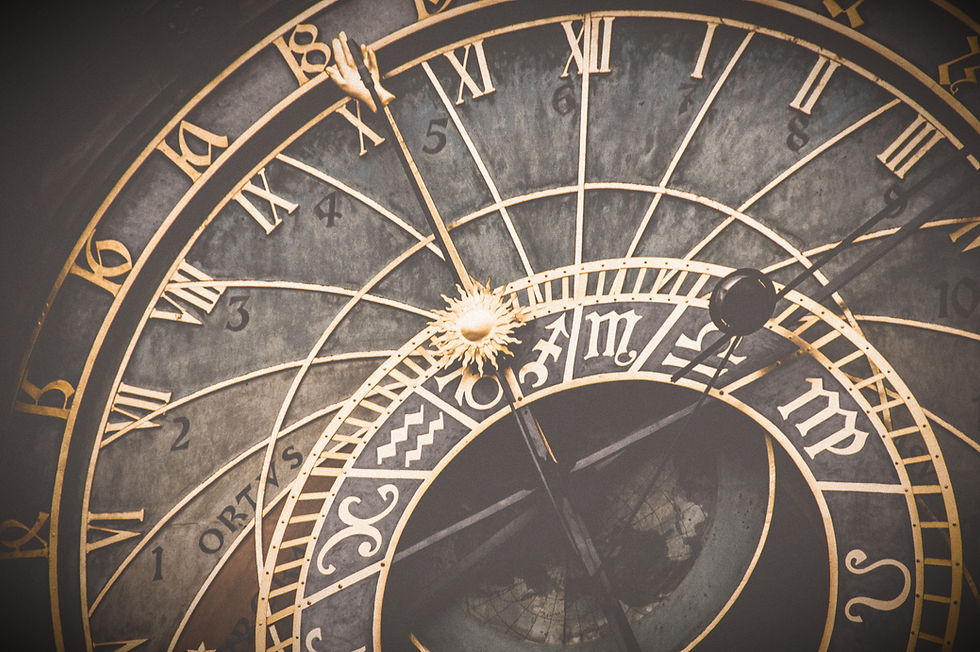Tik-Tok Tik-Tok, Time Seems Irrelevant to Thymus
- dianadem
- Jul 13, 2020
- 4 min read
Updated: Aug 16, 2020
"If you could please give me the higher heart to tolerate my mind and love my matters"
In one of the previous posts about the circadian clock (you can find it here) mentioned at us having these special genes that eventually respond by upregulation or downregulation to the different signals of the daily cycles and through these actions, they control the cell cycles, signaling systems that all together build up our internal clock.
Making the Thymus Tick

There seem to be a couple of almost mysterious organs that don't abide by the laws of the internal clocks. One of such organs is the thymus. In the thymus gland, the clock-genes don't respond in the same manner to the external and internal stimuli as most other organs do. The clock-genes are expressed at a constant level over a 24h period.
So they don't work as oscillators of the thymic cells. Interestingly, the same kind of time-independence is going on with the testis - the clock genes in the testis are expressed at a constant level.
Why doesn't thymus "abide the laws of time" is not clear, but it seems plausible that such time-independence is going on in tissues with many immature cells.
Thymus, What Thymus?
The thymus gland is one of the central organs of the immune system. The immune function of the thymus wasn't discovered until the 1960s, in 1961 Jacques Miller discovered that after experimental animals without a thymus at birth were incapable of rejecting foreign tissues and they also couldn't resist the many infections. After these discoveries, specific immune cells were discovered, namely T-cells (T for "thymus"). In the thymus, T-cells go through a process of maturation. Before these discoveries, it was thought that thymus carries no functions.
Process of Adequate Translation
We have touched on a topic of microbiome here. The latest research shows that a well-functioning immune system is dependent on the effective crosstalk between microbes and immune cells of the mucosa. The gut innate or innate-like lymphoid cells of the gut mucosa interact with gut microbes and a group of specialized dendritic cells (plasmacytoid dendritic cells) cross-reference the information with the thymus gland. The result of this translation process stimulates the thymus to produce new colonies of thymic lymphocytes according to the health and variety of the current microbiome. These processes are happening mostly at early infancy, shaping the basis of our immune 'repertoire' and affecting the pattern of responding to microbial and viral load and the risk of autoimmune disease later in life.
Mucosal and Immunology Biology Research Center Director Alessio Fasano, MD "How we 'choose' our ideal microbiome to teach our immune system to defend us rather than harm us is still a big question mark."
The Ayurvedic Perspective

The Ayurvedic theory of immunity is called beej-bhumi theory ("seed and land theory") - your body is fertile land and there are seeds around it in the wind (one of the translational ways is in the ether, air)
When the body is flooded with toxic accumulations (Ama) and there is not enough life force (Ojas), the seeds may become pathogens.
When these components are optimal and the person is living a Sattvic lifestyle, the seeds grow in symbiosis.
Interestingly the word for thymus in Sanskrit is dhumah (dhumo-) means smoke or vapor. The greek word thymos is related to thymon (thyme), which had been derived from PIE root *dheu- (1), base of words meaning "smoke,". Don't you now just wonder how may vapor relate to the topic?
On a more esoterical note not linked to Ayurveda, it is known that thymus is called the higher heart. The place of all-loving compassion and harmony. Which seems to link up quite nicely...in a way.
Thymus Regeneration

Have you been also wondering about the process of thymus involution? At an early stage of life, thymus starts to lose its cells through a process of programmed cell death (apoptosis) and thymic tissue is replaced with fatty tissue. This process begins at early childhood, peaks at puberty, and after the initial phases, continues at a rate of 1-3% of thymic tissue a year. Acute life events like acute viruses, chemotherapy or hormone therapies may cause acute degeneration of the thymus.
Researches have found a strong link between T cell production and incidence of both infectious diseases and cancer (incidence rise inversely proportional to T cell production), T cell production depends partially on the area of thymic tissue.
It is known that thymic involution is influenced by the sex hormones - high levels of androgens contribute to thymic involution.
We need more studies concentrated on thymic regeneration and preservation patterns. Studies suggest that interleukin 7, interleukin 22, insulin growth factor 1(IGF-1)and growth hormone (GH) may be the keys to those patterns, although most of the studies are pre-clinical.
New evidence suggests that the Keratinocyte Growth Factor may help with thymus regeneration after acute damage.
Let's stay in our higher heart and find the secrets to central tolerance and regeneration. Hope you have enjoyed this post!
References
The early work on the discovery of the function of the thymus, an interview with Jacques Miller; Jacques Miller; Cell Death & Differentiation Cell Death & Differentiation, 27, 396–401(2020)
https://www.nature.com/articles/s41418-019-0462-y
Thymic involution and rising disease incidence with age; S. Palmer, L. Albergante, C. C. Blackburn, T. J. Newman; PNAS February 20, 2018 115 (8) 1883-1888
https://www.pnas.org/content/115/8/1883
Intestinal microbes influence development of thymic lymphocytes in early life; M. Ennamorati, C. Vasudevan, K. Clerkin et al, PNAS February 4, 2020 117 (5) 2570-2578
https://www.pnas.org/content/117/5/2570
Thymus: The Next (Re)Generation; M.S Chaudhry, E. Velardi, J. A. Dudakov; Immunol. Rev. 2016 May; 271(1):56-71.
https://www.ncbi.nlm.nih.gov/pmc/articles/PMC4837659/
Thymus: The Seat of the Human Soul By Suniva Snowe
https://upliftconnect.com/thymus-seat-human-soul/
Lakshmi Chandra Mishra: Scientific Basis for Ayurvedic Therapies, 2004
Maharishi Ayurveda - Fatigue/ Immune System
http://www.ayurveda.org.au/fatigue-immune-system/






Comments